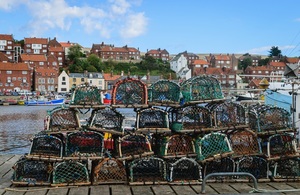Fisheries Bill enters the House of Commons
The Bill, the first major fisheries legislation in nearly 40 years, has passed the House of Lords and has now entered the House of Commons for further scrutiny.

The Fisheries Bill creates the powers for the UK to operate as an independent coastal state and manage its fish stocks sustainably.
The flagship legislation, which creates the powers for the UK to operate as an independent coastal state and manage its fish stocks sustainably outside the EU, has today been introduced to the House of Commons for its First Reading.
The Bill, which passed Third Reading in the Lords on 1 July, ends current automatic rights for EU vessels to fish in British waters. If access to UK waters for foreign vessels is negotiated, the Bill will also enable the Fisheries Administrations to ensure that foreign vessels follow the same rules as UK vessels.
The legislation will ensure that fish stocks, and the marine environment, are better protected for future generations with new powers to set UK fishing opportunities and days at sea, new measures for the Devolved Administrations, as well as a single set of UK-wide fisheries objectives.
Fisheries Minister Victoria Prentis said:
I am encouraged to see the progress of the Fisheries Bill through Parliament. This Bill offers us the opportunity to set a gold standard for sustainable fisheries and gives us the powers to protect our precious fish stocks while enabling our seafood sector to thrive.
Now that we have left the EU, we have the opportunity to create a more resilient and profitable fishing industry, leaving behind the outdated Common Fisheries Policy.
In the House of Lords, Lord Gardiner made clear that the Bill gave the UK the opportunity to develop a vibrant and sustainable fishing industry and gave the UK the power to strengthen our protection of the marine environment, whilst providing a healthy and valuable food source to millions.
The government is now considering carefully the amendments made during the Bill’s passage in the House of Lords.
The Bill’s provisions on sustainable fishing will be underpinned by the requirement for the UK government and the Devolved Administrations to publish a Joint Fisheries Statement to coordinate fisheries management where appropriate, and Fisheries Management plans to achieve sustainable stocks.
The Bill will also ensure:
- EU vessels’ automatic access right to fish in UK waters is removed
- Foreign boats will be required to be licensed to fish in UK waters and will have to follow the UK’s rules if access to UK waters is agreed
- Fisheries will be managed sustainably
- The UK fisheries administrations will seek to ensure increased benefits from fish caught by UK boats in a way that respects the devolution settlements
- Sensitive marine species, such as dolphins, are protected and the bycatch of unwanted fish reduced
- The UK fisheries administrations will continue to collect robust scientific data on fish stocks and shares it to manage shared stocks sustainably
- UK boats can continue to access any part of UK waters, as they do now regardless, whether they are registered in England, Scotland, Wales or Northern Ireland